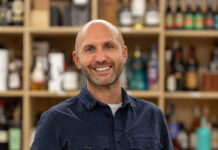By Gillian McKenzie
Kopparberg boss wants to bring his craft beers to the UK
STANDING next to Peter Bronsman in the bottling hall of the Kopparberg Brewery in Sweden last month, where 35,000 bottles whizz round the bottling line every hour, it’s clear he is as passionate about the brewery now as when he bought it 20 years ago.
Over the past two decades, he and his brother, Dan-Anders, have not only built up the Kopparberg brand in their homeland, where it’s said to account for 38% of the Swedish cider market, they have established it as a leading brand in more than 40 countries (95% of the cider produced is exported), including the UK, where it has been at the forefront of the fruit cider category since its official launch in 2006.
The Bronsmans’ business now spans four breweries in Sweden (Kopparberg, in the town of the same name around three hours’ drive north west of Stockholm; Zeunerts in Sollefteå in the north of the country; and Banco in Skruv and Sofiero in Lakolm, which are both in southern Sweden); it employs more than 300 people; produces a range of beers as well as the fruit ciders for which it is best known in the UK; owns five pubs; and, in 2013, posted a turnover of £235 million.
The same year, Peter was named Ernst & Young Swedish Entrepreneur of the Year.
It’s an impressive list of achievements for someone who admits his decision to buy the brewery in the first place was “impulsive”.
In fact, Peter had pursued a career in the merchant navy.
But a near-death experience when he fell overboard and spent two hours in the sea with a broken arm before he was rescued, prompted him to change tack.

Peter and his brother began importing and distributing drinks brands around Sweden, before spotting a story in a newspaper that a brewery in the town of Kopparberg was set to close; the facility had stopped brewing beer back in 1988 and its Swiss owner intended to produce bottled water at the site, due to the area’s soft water.
However, Peter and Dan-Anders saw the potential to return the 130 year old brewery to its roots and, in March 1994, bought the site.
“I showed my wife a picture of the brewery and said to her ‘we’ve done the best deal in the world’,” Peter recalled.
Under the Bronsmans’ ownership, Kopparberg Brewery swung back into action, and began producing beer again in November 1994.
However, early the following year, fire ripped through half of the brewery.
Describing the time as “terrible”, Peter said he and Dan-Anders were determined to get the brewery back up and running.
Their tenacity paid off and, just six months after the blaze, production resumed.
Beer was quickly followed by pear and fruit ciders under the Kopparberg brand and the firm’s turnover has climbed steadily since.
Its brands have enjoyed sustained success in their homeland.
Sofeiro, which has an ABV of 5.2%, is said to have been the biggest-selling beer in the Swedish off-trade – the state-run Systembolaget which numbers some 440 stores and where products with an ABV higher than 3.5% are listed based on a blind taste test – since 2003.
And the firm’s other beers, which include Höga Kusten – a 5.3% ABV lager and ale blend, Fagerhult lager, which also has an ABV of 5.3%, Ricky’s IPA, Wolfgang Pils and Mörka Småland, have also delivered impressive results.
As has the cider range, which spans Pear, Mixed Fruit, Strawberry & Lime, Naked Apple, Raspberry, Cloudberry and Elderflower & Lime variants.
And Peter is clear about the impact he reckons Kopparberg has had on the cider market in the UK, where it is marketed and distributed by joint venture Cider of Sweden, headed by MD Davin Nugent.
“People said it [fruit cider] would never sell but we never gave up.” he said. “Davin and the team came in and opened doors for us; they knew the market.
“The other ciders were all apple; we were the first with pear then Mixed Fruit and then Strawberry & Lime. And the others followed; they were a little bit slower and that was good for me.”
With Kopparberg’s ciders well established, Peter’s next plan is to bring his beers to the UK; some of the range is due to be showcased to consumers and the trade at a special installation in London this summer.
And he reckons the Höga Kusten and Fagerhult brands in particular could do well.
“I think this would be the right way to do it,” said Peter.
“I think it would be wrong for us to take a standard lager to the UK.
“Höga Kusten is a bridge between lager and ale; it’s a unique beer. I have the same feeling about Höga Kusten as I did about pear cider in the UK.”
And there could also be more flavoured ciders on the horizon; Kopparberg Spiced Apple is expected to be in the UK trade from October.
But Peter is quick to stress there won’t be a deluge of new variants any time soon.
“New flavour is not always innovation,” he added. “We have built up something good here so we must not destroy it.”
























